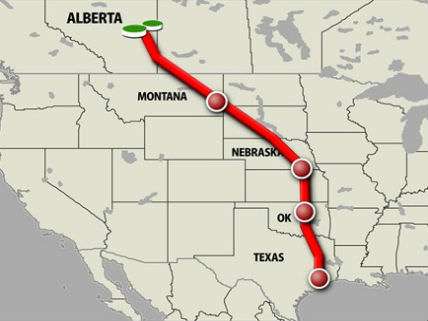Nationwide Keystone Pipeline Protests Today as Senate Prepares to Vote Approval
Would add just 1/100th of a degree to man-made warming by 2100

Opponents of the Keystone XL pipeline have organized rallies across the country today to urge President Obama to rule that constructing it is not in the national interest. The president has this power to reject the pipeline because it crosses our border with Canada. Once operational, the pipeline would transport over 800,000 barrels of Canadian oil sands crude to Gulf Coast refineries.
Last week the House of Representatives passed a bill authorizing construction of the pipeline and the Senate may well vote on the issue this week. In a procedural vote, the Senate agreed 63 to 32 to push forward on a bill approving the construction of the pipeline. President Obama has threatened to veto any such legislation.
Environmental activists argue that enabling the production of petroleum from Canadian oil sands endangers the climate. Why? Because Canada's oil sands hold proven reserves of about 168 billion barrels - the third-largest proven crude oil reserve in the world, after Saudi Arabia and Venezuela. Burning all of that would mean, according to activist climatologist James Hansen "game over for the climate." The hope of the activists is that blocking the pipeline will keep the crude off of world markets and out of your gas tanks.
Activists argue that oil sands crude is particularly "dirty" because producing gasoline from it yields 17 percent more planet-waming carbon dioxide per gallon than does refining gasoline from conventional crude. If so, crude shipped through the Keystone pipeline would emit an extra 18.7 million metric tons of carbon dioxide per year. Another study by the activist group Oil Change International found that burning the oil transported by the Keystone pipeline would emit 181 million metric tons of CO2 per year.
In addition, at the United Nations' Cancun climate conference in 2010, the countries of the world agreed that the world's average temperature should remain below the threshold of 2 degrees Celsius above the pre-industrial average. A study published last week in Nature calculated that to avoid crossing that threshold, Canada would have to leave most of its oil sands crude in the ground unburned. More broadly, the researchers calculated that a third of global oil reserves, half of gas reserves and more than 80 per cent of coal reserves should remain unburned to avoid exceeding the 2 degrees Celsius threshold for global warming.
Even assuming the Nature article's figures, how much would oil transported by the Keystone pipeline add to future temperature increases? Not so much. In Congressional testimony in 2013 climatologist Paul Knappenberger, who is the Assistant Director of the Center for the Study of Science at the libertarian Cato Institute, cited his findings derived from a standard computer climate model used to calculate the effect on future temperatures from burning that much oil. From Knappenberger:
In the case of the State Department's analysis, as there are very few additional carbon dioxide emissions, there is essentially no associated change in the global climate. The change in global average temperature resulting from the EPA's additional 18.7 million metric tons of carbon dioxide emissions per year from the Keystone XL pipeline, would be about 0.00001°C per year—that is one one-hundred thousandths of a degree. The 181 million metric tons per year from the assumption that all Keystone XL oil is additional oil in the global supply would result in about 0.0001°C of annual warming—one ten-thousandths of a degree.
In other words, if the Keystone XL pipeline were to operate at full capacity until the end of this century, it would, worst case, raise the global average surface temperature by about 1/100th of a degree Celsius. So after nearly 100 years of full operation, the Keystone XL's impact on the climate would be inconsequential and unmeasurable.
The recent fall in the price of oil and rising costs for construction have made the business case for building the pipeline harder to sustain. As ditherer-in-chief, President Obama must be pretty pleased by this circumstance.


Show Comments (38)